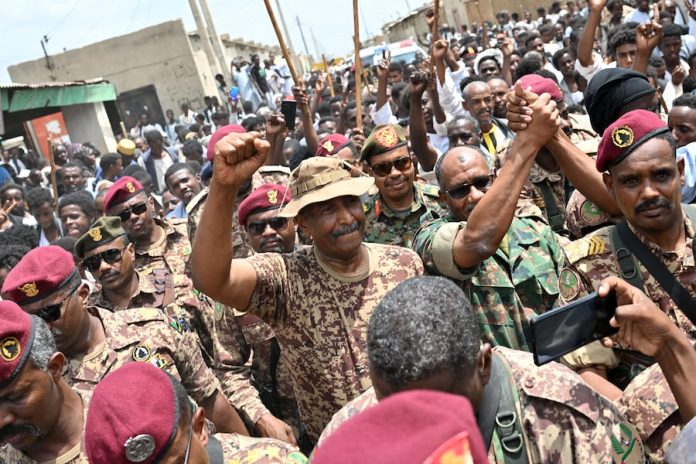Facebook Twitter (X) Instagram Somali Magazine - People's Magazine
On Wednesday, a drone attack targeted the Gibeit army base in eastern Sudan, during a graduation ceremony attended by Sudan’s army chief, General Abdel Fattah al-Burhan. The strike resulted in the deaths of five people and occurred approximately 100 kilometers from Port Sudan, the de facto capital of the Sudanese army.
Burhan’s Response After the Sudan Drone Strike: No Retreat, No Negotiation
Despite the attack, General Burhan remained in the area and addressed the troops, dismissing any notion of retreat or negotiation with adversaries. “We will not retreat, we will not give up, and we will not negotiate with any entity,” Burhan declared, adding, “We do not fear drones, we only die when God has planned.”
RSF Denies Responsibility for the Sudan Drone Strike
The Rapid Support Forces (RSF), the army’s main rival in the ongoing civil war, denied involvement in the drone strike. Mohamed al-Mukhtar, a legal adviser to the RSF, suggested that the attack was a result of internal disagreements among Islamist factions, distancing the RSF from the incident.
Escalation of Drone Attacks
The Gibeit base attack is part of a broader pattern of escalating drone strikes on army positions throughout Sudan. Over the past two days, strikes have also been reported in Kosti, Rabak, Kenana, and al-Damer, reflecting the increasing intensity of the conflict between the RSF and the Sudanese army.
Background of the Conflict
The conflict between the RSF and the Sudanese army erupted in April 2023 over a plan to integrate the two forces during a political transition towards elections. The war has led to the displacement of over 10 million people and created one of the world’s most severe humanitarian crises, with half of Sudan’s population facing hunger.
Efforts for Peace Talks
Amid the ongoing violence, efforts to mediate the conflict continue. The U.S. has extended an invitation for peace talks in August, which the Sudanese foreign ministry has conditionally accepted. However, Burhan emphasized that any mediation must respect Sudan’s sovereignty and involve the Sudanese government in deciding the topics and participants.
RSF Gains and Humanitarian Impact
The RSF has made significant territorial gains during the conflict, including control over the capital Khartoum and most of the Darfur region. Recent RSF incursions into southeastern states have further displaced populations and exacerbated the humanitarian crisis. Despite these challenges, peace talks co-sponsored by Saudi Arabia, Egypt, and the United Arab Emirates are viewed as a critical opportunity to end the war, though previous ceasefire efforts have failed to produce lasting results.

